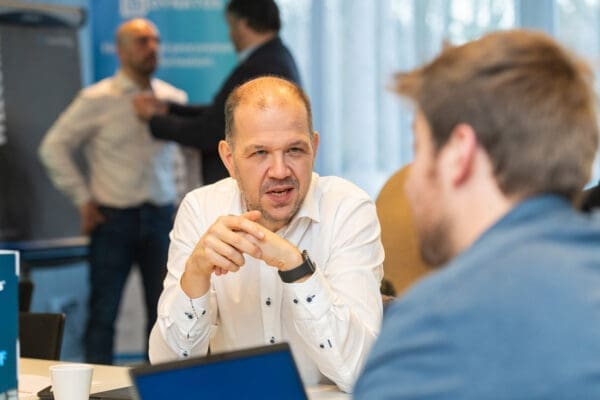One of Dynatos’ employees is business consultant Yves. With his 20-year track record in finance and IT, he knows the bottlenecks within large finance departments.
Well, “Hello there.” My name is Yves. I am one of the Dynatos guys. At Dynatos Belgium, I am pretty much the oldest (not the wisest) geezer, probably because I have a broad 20-year professional track record. When I am not working, I drive around my children, bringing my 8-year-old daughter to dancing and gymnastic classes and my 12-year-old son to soccer pitches all over the country. Luckily, I do not have to drive around my wife.
Directly after school, I started working for a big Belgian bank, first in a commercial position, making people and management happy. However, I struggled daily with the bank’s dully, outdated, not-so-user-friendly software. So, I made the first jump. I wanted to become a game changer and a software developer!
I moved to the bank’s IT department and quickly realized I was a bit different compared to my colleague developers (no, not physically); I used to be an end-user. I somehow always asked myself the question, what is the real benefit? How would I experience this “application” as a user? I have challenged many requirements and have hit the wall quite a few times, but I am sure that by challenging, the internal business departments appreciated I was thinking out of the box.
Over the years, I have learned a lot about the bank’s IT development systems, IT infrastructure/architecture, and IT project management. I became a project manager, but for some kind of reason, I always ended up being the Chinese volunteer handling project management of not-so-standard Java projects—the kind of applications they use in dealing rooms. It was challenging, surely, since the needs and business contexts changed constantly in those environments. Approaching these developments with a traditional project approach (the one and only “waterfall” methodology) was not an option; we needed to be agile. It’s not that easy in the conservative context a bank used to be in those days. However, we delivered!
During the dark days of the bank, the IT development strategies changed. From doing all developments in-house, we started to outsource the developments. The first candidates for outsourcing were the exotic Java applications. The ones that I was handling with my team. So, I started outsourcing Java applications; it was a great experience, and I worked with great people. However, I quickly realized I was preparing for the industrialization of outsourcing, and after ten years, I needed to jump again. I wanted to be back in my comfort zone, and for me, this meant the zone between business and IT, speaking the language of both worlds. However, I had one extra constraint: I wanted to travel!
One advantage of working in a big, massive, multinational bank is that they offer tons of opportunities; you only need to take them. I seized one of those opportunities and became an international SAP business analyst in the heart of the bank’s finance department. I have done many workshops, traveled a lot (earned a lot of air miles J), written blueprints, and had long and extremely bloody fights with senior managers about approval workflows. Nevertheless, I always managed to have applications that make sense and make life easier.
So, what made me jump to Dynatos?
I worked with Dynatos on a couple of these challenging SAP projects, and I instantly liked their no-nonsense and innovative approach: Work hard, play hard, get the job done, but also think two steps ahead.
In many ways, Dynatos is the exact opposite of a large bank, and that felt exactly like what I was looking for: quick & agile by nature, young and ambitious, with a small, flat organizational structure. A place where I can have an impact and offer incredible stuff that blows our customer’s socks off.
Looking back at the past four months, I have, as expected, easily integrated at Dynatos. It feels like I have been here for years. I have learned and seen so many new things that it is hard to believe I was unaware. I must have had blinders or so.
I have become much more aware of the ongoing transformation. Yes, digital transformation is happening at this moment. Moreover, not only finance is undergoing transformation; other industries will look different in a couple of years.
In recent years, I have often seen well-qualified people doing hideous, repetitive, brain-killing tasks. No longer being intellectually challenged killed their motivation; going that extra mile was no longer an option. The end is there for those hideous, repetitive tasks.
“Robots”! Yes, you have read “Robots” well. Robots are going to take over the tedious, annoying, repetitive tasks. Not those orange robot arms you typically see in car factories. Robotic software, of course. Software that assures that people no longer have to spend time on brain-killing tasks; they can apply their skills to activities that require a human touch. Activities that motivate and re-activate the willingness to go the extra mile.
Just to give you an idea!
At that big bank, we created a monthly KPI report on the SAP AP platform. The kind of report that gave management an idea of invoice volumes handled per country and time needed to book, approve, and pay, the PO ratio, the time needed to pay an invoice, and all kinds of exciting stuff management wanted to know.
It took my colleague about two days to create this report. (There were about 75 company codes). He needed to go into SAP, pull out different kinds of reports, save these reports on a network drive, consolidate all these reports in an Excel sheet, create pivot tables, generate graphs, consolidate the gathered information in a fancy Word document, export the word document to a PDF format and send out the PDF document to management via mail. All the steps needed to do this were nicely documented in Excel.
Suppose my old colleague would have known that he could create a robot with Robotic Process Automation solutions From Kofax or Automation Anywhere that Dynatos is offering. A robot would generate this report for him once a month, and a robot would send out the report to all the management. A robot would allow him to use his time more usefully for more complex things, things that need a human touch. I am sure the same colleague would still work for the big bank. The apparent thing happened to him: he studied long and hard, and when he left school, he wanted to do challenging things. Creating a report that management only examines for 10 minutes once a month is not one of those things. He left and became a game-changer somewhere else.



